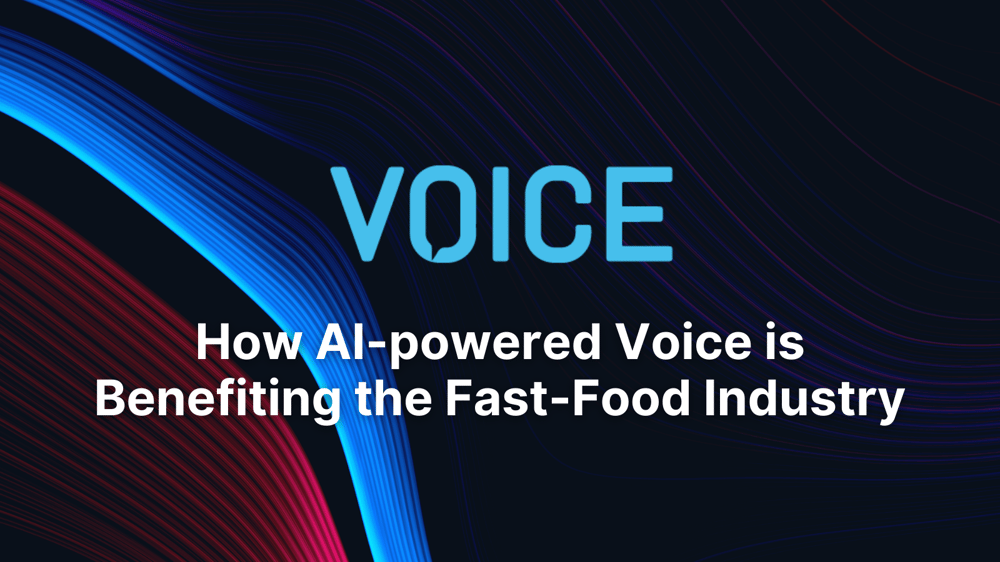How AI-powered Voice is Benefiting the Fast-Food Industry
Modev News VOICE Summit 22-07-18 Modev Staff Writers 4 min read

It was a surprise to no one that takeout (and drive-throughs) spiked during the pandemic. With social distancing in full effect and businesses (particularly restaurants) forced to close their doors for extended periods, we didn't need Nostradamus to tell us takeout would boom. And in that boom, many fast-food chains turned to AI-powered voice tech to try and turn a crisis into an opportunity - and that bet paid off.
This post looks at some of the most significant ways AI-powered voice tech has benefited the fast-food industry.
Faster Food
Efficiency is the big winner here. Given that it was pretty obvious to everyone that takeout and drive-through were about to spike, Quick Service Restaurants (QSRs) needed to find a way to supply that exploding demand without creating massive queues and delays. And AI-powered voice tech was up to the challenge.
Whether ordering at the drive-through or via a voice assistant app while driving or before leaving the house, AI-powered voice tech provides QSRs with efficiency gains. Regarding both drive-throughs and takeout, voice assistants reduce the amount of time employees spend taking orders from customers. That translates to faster drive-throughs or pick-up, shorter queues, and greater workforce efficiency, as employees can spend more time on more critical tasks.
According to a recent study by Hospitality Insights, QSRs incorporating a voice-enabled ordering system increased drive-through revenue by 10 to 20%. That increased revenue came down to the ability of voice-based ordering systems to reduce the time it takes for a customer to arrive at the drive-through and leave with their food.
More Personalized Customer Experiences
Wait, talking to a machine is a more personalized customer experience? Yep. And it's not really difficult to understand why.
Voice assistants learn as they operate - and they have better memories than elephants. That means that voice assistants collect data with every task they accomplish. They then process that data and use it to enhance its capacities. A voice assistant can "recognize" you on your subsequent visits and provide you with an experience tailored to your needs and expectations.
In practice, this translates to the voice assistant displaying your past order history, enabling you to select your favorite items very quickly. Voice assistants can also suggest other items based on your past preferences. And, should you choose to share that data, it can even remember if you suffer from certain food allergies or have any dietary restrictions. A human being could never do all of that.
So yes, machines can provide more personalized experiences than humans can. And those capabilities are quite profitable. Case in point: a recent study by Single Grain found that roughly 80% of people surveyed were more likely to frequent businesses that offer personalized experiences. That means that the 80% of respondents mentioned above is more likely to do business with companies that deploy voice assistants.
Besides that, voice assistants collect valuable, actionable data and insights that help QSRs understand their customers better. Using predictive analytics and sales forecasting methods also enables them to plan for the future more accurately, identify data patterns to create more targeted marketing campaigns, as well as improve menu planning and pricing.
Increased Upselling Increases Profitability
You think that actual human beings are better at upselling? Think again. A 2021 study by Forbes concluded that when customers used voice assistants to place their orders, those orders increased by 20 to 40%. That's massive.
The uptick in upselling is tied to the above point on personalized experiences. Voice assistants can make more targeted recommendations based on the customer's past order history. Hence, the voice assistant has a better chance of generating a hit or a sale than a human. With its ability to make successful recommendations, the voice assistant also enhances the customer experience by exposing items they may be interested in but hadn't seen on the menu. That's a win for both the customer and the restaurant.
Voice assistants also remove pressure from customers as they consider what to order. Many customers feel somewhat pressured to decide more quickly when it's a human waiting to take their order than if it's a machine. But they don't feel they're wasting anyone's time when talking to a machine. That tends to compel customers to take their time to browse the menu and consider what to order. And when they do that, they're likely to order more rather than less. Conversely, in a high-pressure situation, people fall back on the tried and tested and are less likely to add new items to their orders.
Warp up
AI-powered voice tech in the fast-food space is a win-win situation. It's a win for the customer and the restauranteur. They both get more of what they want faster and more efficiently. As voice tech keeps growing, it will continue to provide new opportunities for businesses and immersive, efficient, and personalized experiences for customers.
The future is vocal.
About Modev
Modev was founded in 2008 on the simple belief that human connection is vital in the era of digital transformation. Today, Modev produces market-leading events such as VOICE Global, presented by Google Assistant, VOICE Summit, and the award-winning VOICE Talks internet talk show. Modev staff, better known as "Modevators," include community building and transformation experts worldwide. To learn more about Modev, and the breadth of events offered live and virtually, visit modev.com.